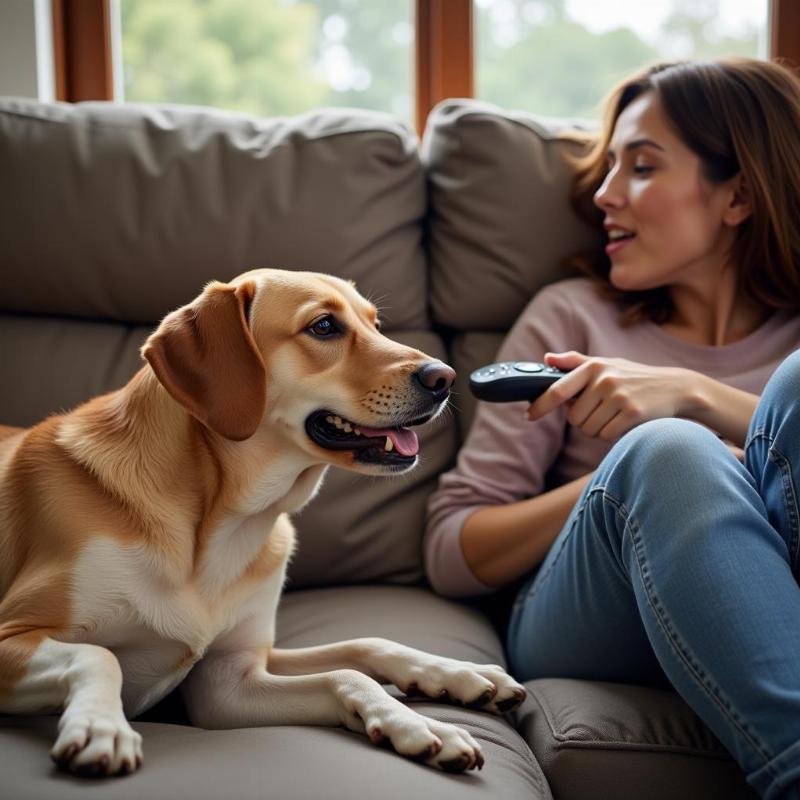Dog possessiveness towards a female owner is a complex behavior that can manifest in various ways, from subtle guarding of personal space to more overt displays of aggression. Understanding the root causes of this behavior is key to addressing it effectively and fostering a healthy, balanced relationship between the dog and owner. This possessiveness isn’t about the dog “owning” the person, but rather stems from insecurity, anxiety, or learned behaviors. In this article, we will delve into the reasons behind dog possessiveness towards female owners, explore the signs to watch out for, and provide practical solutions to help you navigate this challenging dynamic.
Why is My Dog Possessive of Me (Female Owner)?
Several factors can contribute to a dog’s possessive behavior towards their female owner. One common reason is resource guarding, where the dog perceives the female owner as a valuable resource, much like food or a favorite toy. This can be intensified if the dog has experienced instability or inconsistency in their past, such as rehoming or changes in household dynamics. Another contributing factor is anxiety, particularly separation anxiety. If the dog is highly attached to their female owner, they may become possessive and protective when anticipating separation. Hormonal influences can also play a role, particularly in unneutered males. Finally, learned behavior is a significant factor. If the dog has been inadvertently rewarded for possessive behaviors in the past, such as by being given attention or treats when displaying guarding behaviors, they are more likely to repeat those behaviors in the future.
 Dog showing resource guarding behavior towards female owner
Dog showing resource guarding behavior towards female owner
Recognizing the Signs of Possessiveness in Dogs
Identifying possessive behavior is crucial for early intervention. Common signs include growling, snapping, or barking when someone approaches the female owner, especially when she is being affectionate with others. The dog might also physically block access to the owner, stand stiffly over her, or exhibit whale eye (showing the whites of their eyes). More subtle signs can include lip licking, yawning, or a tucked tail, all of which can indicate underlying stress and anxiety. These behaviors can escalate if not addressed, so it’s important to recognize and address them proactively.
How to Address Possessive Behavior in Your Dog
Addressing dog possessiveness requires a multi-pronged approach. First, consult with a certified professional dog trainer or a veterinary behaviorist. They can assess the situation, identify specific triggers, and develop a tailored behavior modification plan. Basic obedience training is essential to establish clear communication and boundaries. Teaching commands like “leave it,” “drop it,” and “off” can help redirect the dog’s focus and interrupt possessive behaviors. Desensitization and counterconditioning can gradually help the dog associate positive experiences with the presence of others near their female owner. This involves gradually exposing the dog to the trigger while rewarding calm and relaxed behavior. Managing the environment is also key. Avoid situations that trigger the dog’s possessiveness, such as allowing the dog to sleep on the female owner’s bed or sit on her lap when visitors are present.
Creating a Safe and Harmonious Environment
Building a positive relationship based on trust and respect is crucial. Provide your dog with plenty of mental and physical stimulation through exercise, playtime, and interactive toys. This can help reduce anxiety and redirect their focus. Avoid punishing the dog for possessive behaviors, as this can worsen their anxiety and potentially lead to aggression. Instead, focus on positive reinforcement, rewarding the dog for calm and appropriate behavior. Consistency is key. Ensure that everyone in the household follows the same training techniques and rules to avoid confusing the dog and undermining progress.
Conclusion
Dog possessiveness towards a female owner is a challenging but manageable behavior issue. By understanding the underlying causes, recognizing the signs, and implementing consistent training techniques, you can help your dog overcome their possessive tendencies and build a stronger, healthier relationship based on mutual trust and respect. Remember that patience, consistency, and professional guidance are key to achieving lasting results and fostering a harmonious environment for both you and your furry companion.
FAQ
- Is it normal for a dog to be possessive of its owner? While some level of attachment is normal, excessive possessiveness can be problematic and requires intervention.
- Can spaying or neutering help with possessiveness? In some cases, spaying or neutering can help reduce hormonally driven possessive behaviors, especially in males.
- What should I do if my dog growls at me when I try to move him? Do not attempt to force the dog to move. Consult with a professional dog trainer to address this behavior safely and effectively.
- How long does it take to correct possessive behavior? The timeline varies depending on the severity of the behavior, the dog’s individual temperament, and the consistency of training.
- Can I train my dog myself to overcome possessiveness? While some basic training can be done at home, it’s recommended to seek professional guidance for complex behavioral issues like possessiveness.
- What if my dog’s possessiveness turns into aggression? Seek immediate professional help from a certified dog trainer or veterinary behaviorist experienced in aggression cases.
- Are certain breeds more prone to possessiveness? While any dog can exhibit possessive behavior, some breeds are genetically predisposed to guarding tendencies.
Related Articles on Beautdogs.us
Check out our articles on dog anxiety, separation anxiety, and resource guarding for more information on related topics.
About Beautdogs.us
Beautdogs.us is your premier online destination for comprehensive and reliable information on dog care, breeds, and lifestyle in the United States. We offer expert advice, product reviews, and valuable resources for both new and experienced dog owners. From understanding your dog’s behavior to finding the perfect products for their needs, Beautdogs.us is your trusted companion on your journey with your beloved canine friend. Contact us today for personalized guidance and support: Email: [email protected], Phone: +1 501-555-7529.